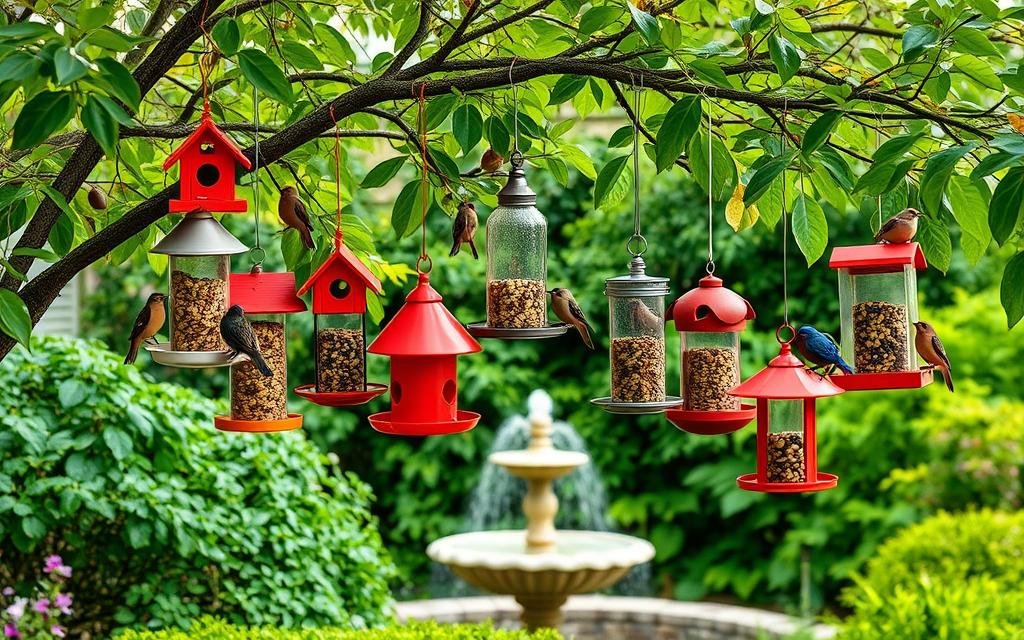Standing at my kitchen window, holding a warm mug, I love watching the birds at my feeders. Their lively chirps and movements bring me calm and joy. It’s a key part of my day.
During the COVID-19 pandemic, these birds were a comfort. They remind us of life’s simple joys amidst hard times. According to the U.S. Fish and Wildlife Service, over 50 million Americans enjoy this comfort. It’s more than a hobby; it’s healing for us and the birds.
Studies show that bird-feeding can reduce stress, anxiety, and depression1. The wild bird products industry is booming, with sales expected to exceed $2 billion this year1. Seeing birds like cardinals or chickadees reminds us of our connection to life.
Feeding birds also brings families together. It bridges gaps between generations and connects us more deeply to nature1. With mental health challenges on the rise, this hobby becomes even more valuable.
The Connection Between Nature and Mental Health
It’s clear that being in nature helps our minds feel better. Nature therapy uses nature’s healing power to boost mental health. Simple activities like connecting with nature or relaxing outside can reduce stress and worry. Many studies back this up2. Also, more people bought birdseed during the pandemic. This shows more people are turning to nature for comfort2.
Understanding Nature Therapy
Nature therapy means getting into nature to improve mental well-being. Stephen Kaplan’s research explains how nature offers a break from brain tiredness. This idea is proven as people feel happier after watching birds through the Cornell Lab of Ornithology’s Project FeederWatch2. Terry Hartig studies how nature makes us stronger against life’s stresses2.
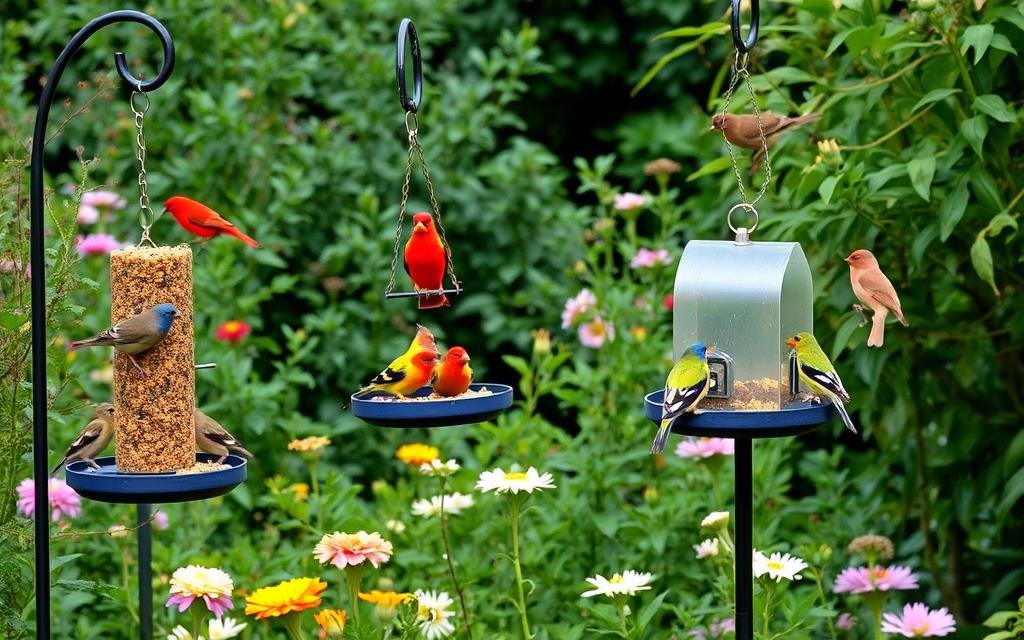
Biophilia and Its Impact
E.O. Wilson’s biophilia tells us we naturally love nature. This love helps our mental and brain health when we do outdoor activities or enjoy the variety of life. A study in 2017 found that neighborhoods with at least 20% plants can make people less depressed and stressed. Having 30% plants around can even lessen anxiety3. In 2020, a study revealed that seeing more birds can make us as happy as getting $150 more every month3.
Bird Watching as a Stress Reliever
Birdwatching pulls people from the rush of everyday life, offering solace in nature. Watching birds dart and dance brings calmness, easing the pressures we face every day.
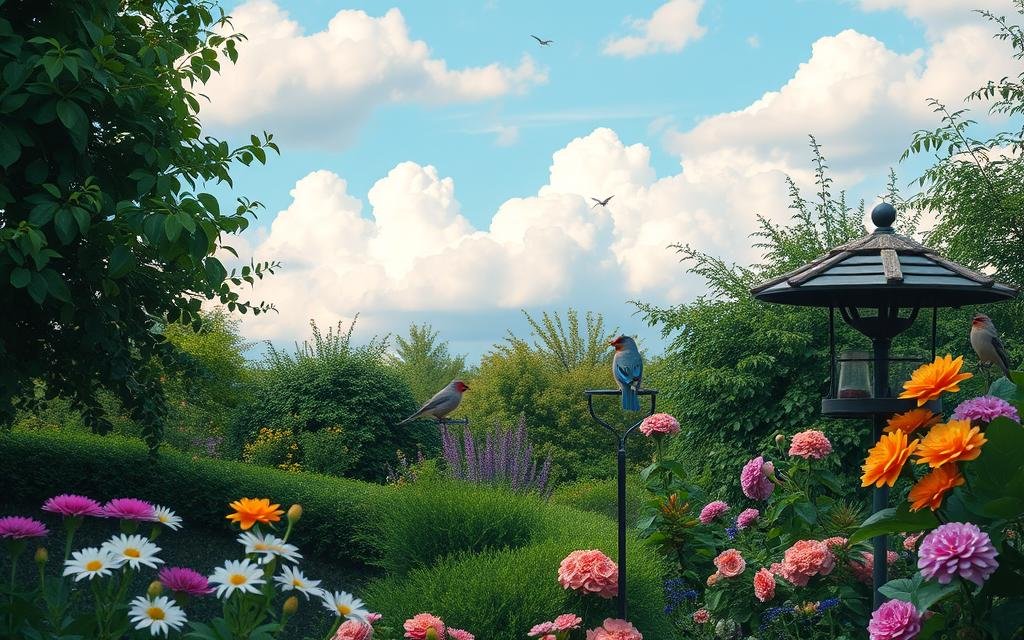
Stress Reduction Through Birdwatching
Research shows that being in nature-like birdwatching-significantly eases stress and relaxes us4. Watching birds’ predictable patterns is like meditation. It brings peace and keeps our minds clear5. Plus, the mild physical activity involved boosts our mood by increasing endorphins5.
Regularly observing birds also gives a feeling of accomplishment. It supports wildlife by keeping bird feeders and creating habitats4.
Mindfulness in Nature
Watching birds in the wild promotes mindfulness and relieves stress5. Just 20 minutes in nature, like birdwatching, cuts down stress hormones6. This activity reduces bad feelings and boosts mental health6.
The sound of birds singing helps recover from stress and refocuses attention5. Birdwatching is not just calming it also connects us with wildlife. This deepens our peace and stress relief.
Creating an Outdoor Sanctuary with Bird Feeders
Turning my garden into a peaceful retreat begins with adding bird feeders. By placing a feeder near my favorite window, my garden turns into a sanctuary. It’s not just peaceful, but it also helps me feel closer to nature, which is very important when life gets busy. By adding a few feeders, our backyards can attract many kinds of birds.
Did you know 70% of people feel better mentally from feeding birds once a week7? Backyard birding is the 2nd most popular outdoor hobby in the U.S., showing many enjoy this simple pleasure7. Plus, having bird feeders means we can watch many birds, especially in winter8.
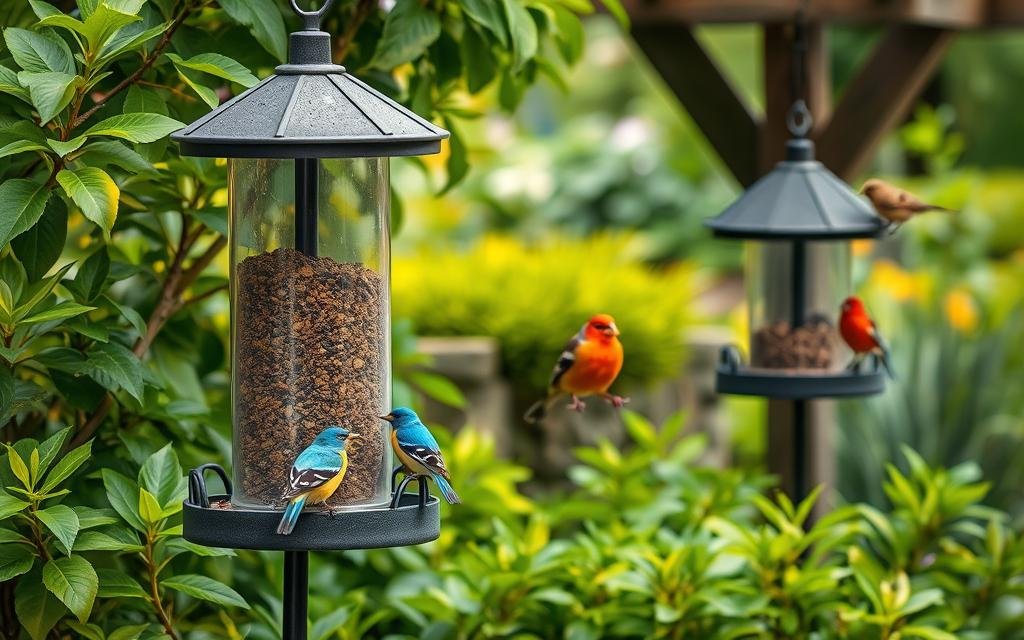
Choosing the right food makes bird feeding even better. Sunflower seeds attract different birds because they’re full of nutrients8. Feeders with niger or thistle seeds draw small finches like goldfinches8. And I’ve seen bluebirds go crazy for dried mealworms. Offering fruits like apples or oranges can bring robins and bluebirds right to your yard8.
Adding a water source near the feeders brings even more birds, especially when it’s cold8. Watching these birds isn’t just enjoyable. It also helps local economies, farmers, and the environment. It leads to more greenery and controls pests naturally7. According to the WBFI, feeding birds in our backyard is a step toward healing our planet7.
Plenty of Hummingbird Feeders
Birdwatching is a popular hobby that brings joy, relaxation, and a closer connection to nature. One of the best ways to attract and observe birds in your garden is by setting up garden bird feeders. These feeders serve as an abundant food source, bringing a variety of bird species right to your doorstep. If you’re particularly interested in attracting hummingbirds, there are plenty of hummingbird feeders available on the market designed specifically for these beautiful creatures.
Hummingbirds are tiny, vibrant birds known for their swift movements and their unique ability to hover mid-air. They are especially fond of nectar-rich flowers, but a well-placed hummingbird feeder can provide them with an additional source of sustenance. When choosing a hummingbird feeder, opt for one with bright colors and attractive designs that will catch their attention. Additionally, consider purchasing a feeder with multiple feeding stations, as hummingbirds are often possessive of their territory.
Setting up a bird feeding station in your garden can be a delightful and rewarding experience. Not only will you be able to enjoy the company of these amazing creatures, but you’ll also have the opportunity to learn more about bird identification. By observing the bird species that visit your feeders, you can expand your knowledge and appreciation for the avian world. With a variety of feeders available, you can customize your feeding station to attract different types of birds, further enriching your birdwatching experience.
If you’re looking to create a captivating bird haven in your garden, consider investing in a range of feeders, including specific options for hummingbirds. These feeders will not only attract a vibrant array of bird species but also provide you with endless entertainment and the chance to expand your bird identification skills. Remember, when setting up your bird feeding station, be patient as it may take some time for the birds to discover and frequent your feeders. Soon enough, you’ll be enjoying the charming presence of these feathered friends right outside your window.
Benefits of Watching Avian Visitors
Watching birds in one’s garden is a treat for the senses. It offers a peek into the wonders of nature. By watching birds, I forget my daily stresses and enjoy the changing seasons9. Birdwatching is great for seniors. It sharpens the mind and keeps the body moving, improving circulation and flexibility9.
The Joy of Bird Behavior Observation
Seeing the unpredictable lives of birds is exciting. The beauty of these creatures has a healing effect. I use different feeders to attract many types of birds to my yard9. Writing down what I see and taking photos make me feel closer to them9. This hobby helps me appreciate nature more and feel connected to the world around me.
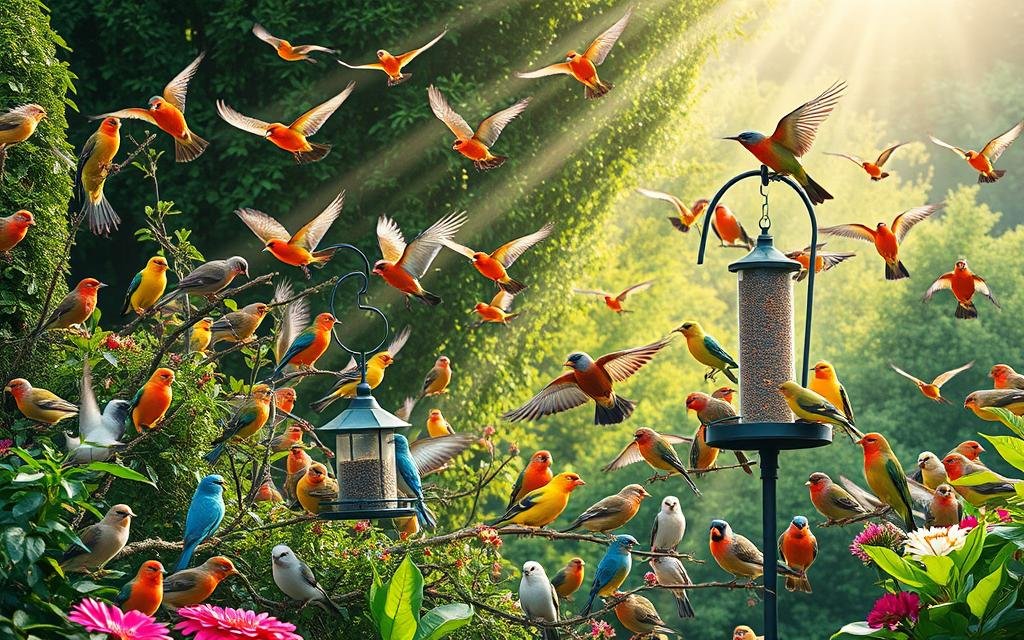
Birdsong Effects on the Mind
Birdsong has a positive effect on mental health. It’s like nature’s antidepressant and makes you feel happier. Listening to birds can profoundly calm and comfort the mind. Having a garden that welcomes birds adds to my happiness9. Bird baths and solar fountains attract more birds. They keep the garden lovely and lively9. My garden, filled with bird songs, becomes a peaceful escape at home.
The Healing Power of Birds: Scientific Evidence
Studies show connecting with birds boosts mental health and brain power. For example, having wild birds in our neighborhoods can make us feel better10. Being around birds and their songs lowers stress and anxiety, making us feel happier11.
Watching birds is key to feeling well, especially in nature. The Urban Mind study found that seeing birds can help people feel less anxious. It even helps people with depression feel better after listening to birds10.

Ecopsychology tells us how birds help heal our minds and emotions. Research links more bird types around us to fewer hospital visits for anxiety and mood issues. Feeding birds in cities also helps us connect with nature and boosts our mood10.
Children who live near woods tend to be healthier in mind, a 2021 study says. Having more types of birds around makes people as happy as getting an extra $150 a month11. This shows birdwatching is vital for our mental health.
Nature and birds play a huge role in feeling good, research confirms. Seeing or hearing birds can make us happier for up to eight hours. It helps everyone, even those with depression. A survey from the Natural History Museum found that 73% of people enjoyed louder birdsong during lockdowns, finding it comforting11.
| Study | Key Findings |
|---|---|
| Urban Mind project | Bird observation benefits people with and without depression10 |
| Natural History Museum Survey | 73% felt comfort from louder birdsong during lockdown11 |
| 2021 study on children | Better mental health and cognitive development near woodlands11 |
Can Garden Bird Feeders Improve Your Mood?
Putting bird feeders in my backyard has really boosted my mood. Watching different birds come by brings peace and happiness. Studies show birdwatching can help lessen anxiety and depression12. It offers a break from daily stress. Plus, taking care of the feeders adds routine and purpose to my day.
Watching the birds at my feeders is a huge mood lifter. I see house sparrows and blackbirds, which is really fun and interesting. It lets me step away from screens and social media13. Instead, I get lost in the joy of birdwatching. It’s a calming and enriching break.
Maintaining bird feeders also brings people together. It’s a fun activity to share with friends who love birds12. This shared interest helps us feel connected and happy.
I’ve learned that feeding birds all year round helps them survive and thrive12. It feels good to know I’m helping local wildlife. Keeping the feeders clean also prevents diseases among birds12. This responsibility makes me feel connected to nature and boosts my mood.
Having bird feeders has made my backyard a happier place for me. It lifts my spirits and improves my mental health. Each day, spending time with the birds shows me how much it helps my mood.
Types of Bird Feeders and Their Benefits
Choosing the right feeder will help you see many different birds in your garden. Knowing the advantages of each feeder type can improve your bird feeding fun. It also helps birds by fitting into nature-friendly garden care.
Platform Feeders
Platform or tray feeders are great for attracting various bird species. They work for almost all 98 North American bird species14. On a large, flat surface, birds of all sizes can easily find food.
Cardinals love these feeders, mostly when filled with sunflower or safflower seeds14. Because you can put different foods out, tray feeders are perfect for watching birds throughout the year.
Tube Feeders
Tube feeders are perfect for smaller birds. These feeders help attract finches, chickadees, and sparrows14. They have a long shape that lets birds eat while perching.
This design reduces wasted seeds and keeps the feeding area clean15. Adding tube feeders to your garden lets you enjoy cute birds and supports a healthy environment for them.
Hopper Feeders
Hopper feeders are awesome for feeding birds in your backyard. They have a box that slowly gives out seeds to birds. This way, the food stays dry and fresh, even in bad weather14.
They draw in many birds like cardinals, blue jays, and woodpeckers, making your garden lively15. Using hopper feeders can make birdwatching more interesting and help birds year-round.
Bird Seed Varieties and Their Impact
Choosing the right bird seed varieties can make your garden a hub for more birds. Quality bird food is key to helping birds thrive and keep the population healthy. For example, sunflower seeds, peanuts, and suet attract different birds, making birdwatching richer.
Variety in bird food helps them across seasons. In spring and summer, birds need protein from insects to feed their young16. Winter brings berries from trees and shrubs as vital food. Plus, watching birds can make you feel happier and less stressed17.
Cutting back on pesticides helps birds by saving their insect food sources16. This boosts garden biodiversity, benefiting birds and making our ecosystem livelier. Also, extra bird food can boost their survival and make our birdwatching better, lifting our spirits17.
| Bird Seed | Attracted Bird Species |
|---|---|
| Sunflower Seeds | Finches, Sparrows, Nuthatches |
| Peanuts | Woodpeckers, Jays, Squirrels |
| Suet | Warblers, Wrens, Chickadees |
By choosing specific bird seeds, we make our gardens ideal for diverse birds. This promotes well-being through calming birdwatching. Knowing the effect of our choices on garden life helps us support birds and our own happiness.
Seasonal Bird Feeding Tips
Feeding birds year-round is key for their survival and our happiness. It gives a boost during winter, adding color and life. Here are bird feeding tips for each season to help our feathered friends thrive.
Winter Feeding Strategies
Feeding birds in winter helps wildlife survive. Chickadees find food in winter, but they need extra support. You can help by providing high-energy foods like suet and sunflower seeds18. These foods give birds the fat they need to keep warm.
It’s also important to keep bird feeders clean to stop diseases19. Adding a camera to a nest box can show you how birds behave in winter. It’s a fun way to connect with nature18.
Summer Feeding Adjustments
In summer, different birds might come to your feeders because of migration. Offer various seeds, fruits, and nectar to meet their needs. Make sure your bird feeders are clean and mold-free. This helps birds stay healthy and successful in breeding. Plus, it makes watching them more enjoyable for you1918.
Boosting Emotional Well-Being with Nature Sounds Therapy
Listening to natural sounds, like birdsong, offers amazing benefits for our emotions. These sounds can greatly lower stress and anxiety. Being around nature can make you feel more relaxed and happier20.
Seeing birds every day can make people feel less depressed and anxious. This shows how important nature is in our lives21. Also, getting outside and doing activities in nature helps both our minds and bodies. This proves that nature’s sights, sounds, and smells can heal us22.
Nature sounds have a big impact on how we feel every day. Watching birds, like robins, makes us feel better and lowers sadness and stress21. Going for walks in the forest also has great benefits, like reducing stress hormones and improving how our nerves work22.
Birdwatching connects us to nature and fights off daily stress. Just hearing birds sing helps us focus better and feel less stressed. It’s an important part of nature sounds therapy20.
By experiencing more of nature, our emotional well-being improves. Being in touch with nature is healing and key to a healthy life21.
Mindfulness and Birdwatching: A Perfect Pair
Pairing mindfulness with birdwatching offers a deeply enriching experience. It greatly reduces stress by practicing mindfulness outdoors. Watching birds acts as meditation, needing patience, quietness, and slow breathing. This makes individuals feel more at peace23.
Engaging in birdwatching boosts mindfulness and connects us with nature. It builds knowledge and curiosity about different bird types23. It draws people into creative activities like taking photographs and pursuing creative projects. This shifts focus from stress and anxiety, improving well-being23.
Studies show that the sound of birds singing can refresh our focus and lessen stress. It is a natural sound often related to recovering from stress23. Feeding birds in gardens has also been shown to enhance well-being. It offers mental health advantages24.
Seeing stunning birds like flamingos, peacocks, cardinals, and crows brings moments of joy and marvel. This makes birdwatching more than a pastime. It is a healing activity that merges being mindful in nature with significant emotional and intellectual gains.
The Role of Bird Identification in Cognitive Benefits
Bird watching is more than just a hobby; it’s a way to boost your brainpower. It’s a fun brain workout that helps with memory and focus. Plus, it’s a peaceful activity that can calm your mind.
Enhancing Mental Sharpness
Learning and identifying birds sharpens your mind. It requires careful attention and detail, making your brain work harder. This hobby also improves your ability to remember and process new info25. Plus, by paying close attention to birds, you become more mindful26.
Improving Cognitive Flexibility
Spotting different birds and learning their calls boosts your mental flexibility. Birdwatching trains you to be better at multitasking and thinking quickly. It’s especially good for beginners in birdwatching, helping them adapt and think smarter in all areas of life26.
Eco-Therapy: A Connection with Urban Wildlife
Eco-therapy draws from ecopsychology, showing the deep bond between humans and nature. Natural settings help heal and grow us, proving crucial for mental wellness27. They provide a vital link in urban areas, where bird-friendly gardens keep us close to nature daily.
Being around nature, like birdwatching, lessens stress and lifts spirits. It sharpens our memory too. This form of eco-therapy fights depression and anxiety among city folk28. Also, feeding and watching birds aids in preserving these creatures and their homes28.
Connecting with city wildlife boosts mental health. In the UK, people in bird-rich areas feel less stressed28. Birds and their songs make us happy, linking us closer to nature29.
When we harm nature, our mental health and happiness suffer. Ecosystems offer trillions in benefits, crucial for our well-being27. So, keeping our green spaces and wildlife areas healthy is key for our physical and mental health.
| Type of Eco-Therapy | Activities | Mental Health Benefits |
|---|---|---|
| Green Exercise | Walking, biking, outdoor fitness | Reduces stress and anxiety; boosts mood |
| Horticultural Therapy | Gardening, planting, growing food | Enhances emotional resilience; improves well-being |
| Wilderness Therapy | Hiking, camping, nature retreats | Promotes relaxation; increases mindfulness |
| Wildlife Conservation | Birdwatching, wildlife monitoring | Lowers depression; fosters sense of purpose |
In conclusion, caring for urban wildlife through gardening and birdwatching helps animals and our mental health. Eco-therapy is a great way to feel good and connect with nature, right in our cities.
Feeder Maintenance for Maximized Health Benefits
It’s crucial to keep bird feeders clean for the health of garden birds that visit. Cleaning feeders regularly helps stop bacteria and mold from growing.
Importance of Clean Feeders
Clean feeders are a must. They should be free of mold, spoiled food, and debris. Studies show that bird species vary in their use of feeders based on how clean they are30. A clean feeder means healthier birds, which helps them thrive and reproduce30.
Preventing Disease Transmission
Feeder maintenance isn’t just about looking good; it’s vital for preventing disease among birds. Keeping waste and pathogens away reduces disease spread. Clean feeders are proven to keep garden birds healthy30.
Cleaning bird feeders often is key for a safe birdwatching spot. Following expert advice keeps our gardens safe for birds, balancing nature31.
Conclusion
Looking back at our journey into backyard birding, we see it’s more than just a hobby. It enriches our mental health and connects us with nature. We started by seeing how bird feeders improve our moods and help us manage stress better. This blend of loving nature, therapy outdoors, and being mindful shows how birds visiting our gardens help us feel better.
About half of the homes in the US, UK, and Australia enjoy bird feeding. This shows how popular and beneficial it is32. A study in southern England found that people feeding birds regularly felt more relaxed and connected to nature, making them happier33. Also, listening to birds sing can make us less anxious and paranoid. This has been confirmed by over a thousand people in different countries34.
To wrap up, watching birds and hearing their songs can turn a garden into a peaceful refuge. It highlights the importance of keeping feeders clean and picking the right seed. Bird feeding is not just for fun. It creates a bond that boosts our health and brings us closer to the beauty of nature.
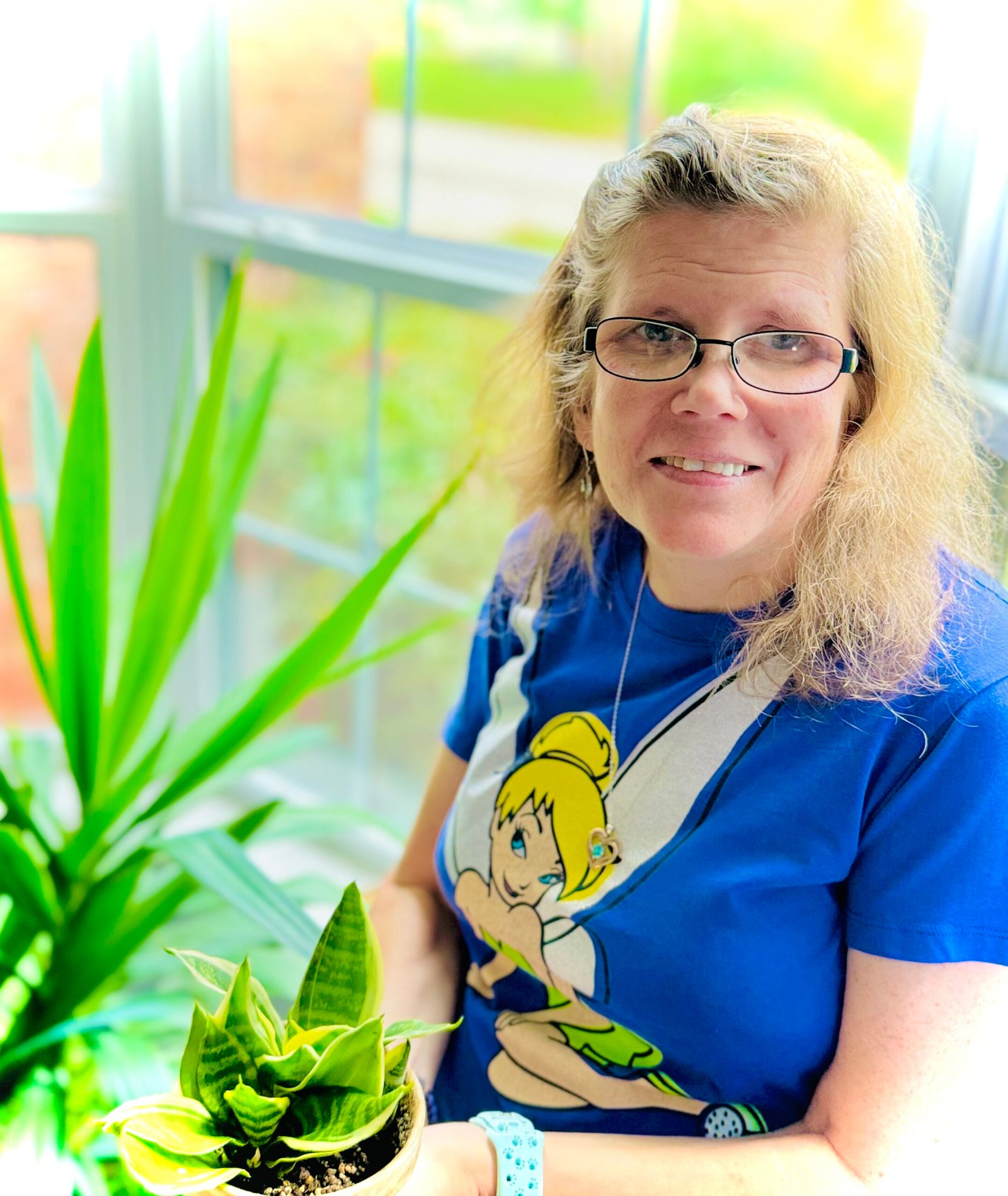
My name is Michelle Warren, and I’m the founder of Peaceful Gardening. As a 10-year breast cancer survivor, I’ve discovered the profound therapeutic power of gardening. This journey has not only helped me recover but has also become my passion and a source of ongoing peace and joy.
Peaceful Gardening was born from my desire to share the healing benefits of gardening with others. Whether you’re facing health challenges, dealing with stress, or simply looking to connect more deeply with nature, this space is for you.
Over the past decade, I’ve cultivated not just plants, but a deep understanding of how gardening can positively impact mental health. I’ve worked with local community gardens, led workshops on mindful gardening practices, and collaborated with mental health professionals to develop gardening-based stress reduction programs.
Peaceful Gardening was born from my desire to share the healing benefits of gardening with others. Whether you’re facing health challenges, dealing with stress, or simply looking to connect more deeply with nature, this space is for you.
Here, you’ll find evidence-based advice on using gardening as a tool for mindfulness, stress relief, and emotional healing. I share personal stories, practical tips, and scientifically-backed information on how to create your own therapeutic garden space, no matter the size of your yard or balcony.
My mission is to help you discover the joy, peace, and healing that comes from nurturing plants and connecting with nature. Join me in exploring how the simple act of tending to a garden can transform your mental and emotional wellbeing.
Welcome to Peaceful Gardening – let’s grow together towards better mental health!”

